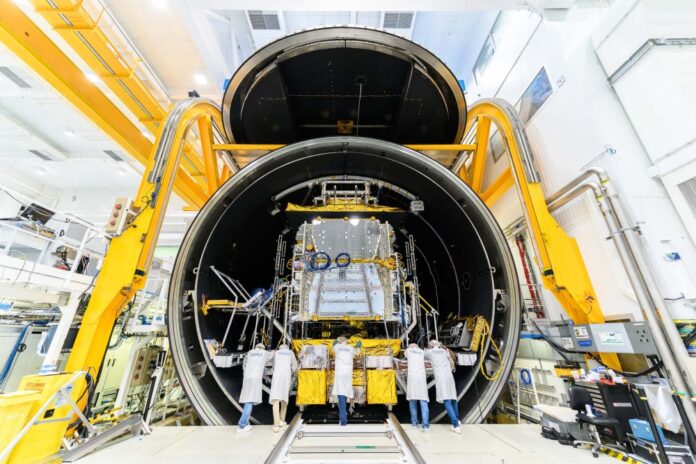The new business would have combined annual revenues of €6.5 billion and create a European space champion, but not in LEO
Italian group Leonardo’s board has become the final of the three partners to approve a merger of their respective space businesses and according to sources, the deal is imminent barring a few technical details. The combined group, dubbed Project Bromo, will have 25,000 people, almost 30 sites across Europe and a turnover of €6.5 billion.
Despite Airbus already contributing around half of that turnover, the deal is reported structured in a way that would see the Franco-German company owning 35% with the other two getting 32.5% each, meaning Airbus will get some form of compensation for the reduced share. And while a European champion to carve a business from a sector dominated by US companies, the three are not without their own problems.
As reported in the FT, all three companies have struggled with their space businesses. “Airbus has taken more than €2bn in charges from underperforming space contracts since 2023 and last year announced 2,000 job cuts. Thales Alenia Space (TAS), a joint venture 67% owned by Thales and 33% by Leonardo, has announced almost 1,300 job losses in the past two years.
Living in a LEO world
So while sovereign space for Europe will be championed, if the new company is to be successful, there will be further pain among its ranks and plenty of “synergies” to be examined. This is even more pressing now as the companies are geo champions in a LEO world.
This is summed up with Eutelsat’s recent results that saw strong growth in its OneWeb low Earth orbit (LEO) connectivity segment but total revenues for the quarter still declining 2.2% year-on-year, due to weaker performances in its video and geostationary connectivity businesses – the latter down 14.4% YoY to €95.3 million. The OneWeb business managed that increase despite putting up hardly any new satellites and still being dwarfed by SpaceX’s Starlink.
Italy’s minister of enterprise and made in Italy, Adolfo Urso , was quick to praise the joint-venture, despite risking the ire of the multitude of small and medium space businesses the country has spawned. “It’s the right path to create more and more European champions, with significant Italian leadership,” he said. “Our companies can ensure Europe’s strategic autonomy on borders and new technologies.”
Mais non
Smaller competitors aren’t the only ones sounding alarm bells with France’s CGT Métallurgie union dismissed the justification for the Bromo project as a false pretext, arguing that Airbus Defence & Space and Thales Alenia Space already dominate the market and hold record order books.
The union claimed that the real goal of the project is to establish a monopoly, raise prices, weaken CNES and ESA, and boost shareholder profits at the expense of public interests and jobs. It warned that ongoing job cuts at Airbus and Thales threaten essential skills and contract delivery, adding that employees have been excluded from the discussions.
The imbalance between geo and LEO tech in Project Bromo suggests the merger aims more to consolidate Europe’s fragmented industrial base than to compete directly in new growth segments. Observers believe it is more motivated by concerns over maintaining competitiveness and political influence within Europe’s space ecosystem, particularly against US and Chinese players, rather than by immediate technological synergy in LEO.
In essence, it’s a defensive industrial policy play to preserve capability and bargaining power in future ESA and EU programmes, rather than an offensive push into the commercial constellation market.




